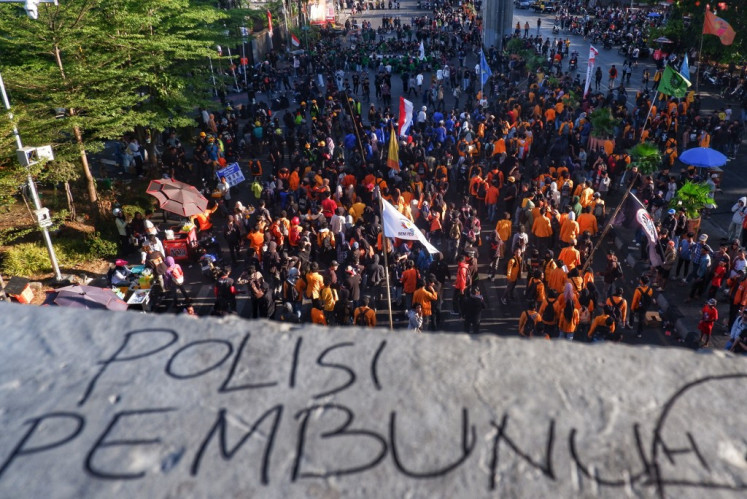Popular Reads
Top Results
Can't find what you're looking for?
View all search resultsPopular Reads
Top Results
Can't find what you're looking for?
View all search resultsForeign investment up, Jakarta takes most
Endowed with rich natural resources and a large population, Indonesia is becoming more attractive for investors as indicated by an increase in the number of realized direct investment projects involving foreign businesspeople
Change text size
Gift Premium Articles
to Anyone
Endowed with rich natural resources and a large population, Indonesia is becoming more attractive for investors as indicated by an increase in the number of realized direct investment projects involving foreign businesspeople.
Chairman of the Investment Coordinating Board (BKPM) Muhammad Lutfi said Wednesday actual domestic and foreign investment had reached US$14.2 billion in the January to November period, higher than the full-year target of $9.92 billion.
Of the total, $12.5 billion was foreign direct investment (FDI), and the remaining $1.7 billion was domestic-based.
“FDI jumped by 40 percent during the period ... But domestic investment plunged by 51 percent,” said Lutfi, who was a member of President Susilo Bambang Yudhoyono’s campaign team during the 2004 election.
“The drop in domestic investment is due to the fact that local companies prefer to form joint ventures with foreign companies in order to pay less tax,” he said, adding that the condition was unlikely to continue as the government would soon implement a new tax law.
Under the new tax scheme, income tax will be slashed to 28 percent in 2009 and to 25 percent in 2010 from the current 30 percent.
The actual investment figure excludes those in the sector of oil and gas, mining, banking and financial institutions, including insurers.
Jakarta received the largest chunk of FDI, reaping $9.62 billion from 404 projects, followed by West Java with $2.39 billion from 255 projects, and Riau with $460.9 million from eight projects.
In domestic investment, West Java ranked the top with Rp 3.67 trillion (US$334 million) from 52 projects, tailed by East Java with Rp 2.56 trillion from 37 projects, and Banten with Rp 1.95 trillion from 29 projects.
According to Lutfi, the transportation, storage, telecommunications, metal, machinery, electronics and automotive sectors were the largest contributors to the investment.
“The good news is that so far some 650,000 people have been employed in the realized investment projects (begun) between January and November.” “This is a sign that our investment climate is getting better. We hope the trend will continue, especially through intense and serious efforts by local administrations to net more investors,” Lutfi said.
Last year, FDI reached $10.34 billion; with top sectors including transport, storage, communications and chemicals and pharmaceutical.
Domestic investment topped Rp 34.8 trillion ($3.16 billion), primarily due to projects involving the paper and printing industry, the food industry and the metal, machinery and electronics industry. (dis)










